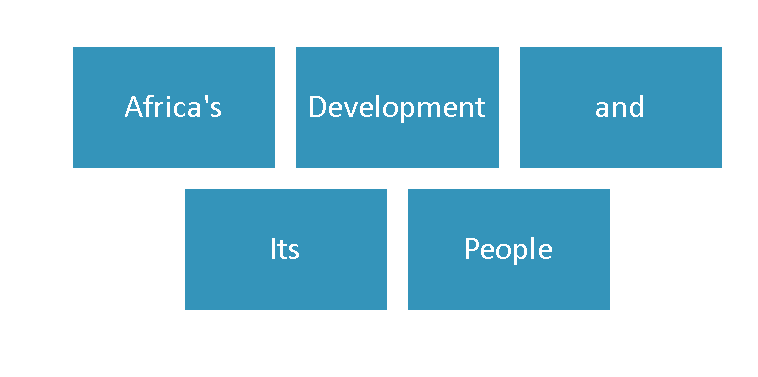Africa is the continent with the youngest and fastest-growing population in the world, as well as rapidly expanding cities and innovative industries ranging from clean energy to fintech. It is a continent full of promise and is at a critical juncture in its economic development. Even though there are glimmers of improvement, long-term obstacles, and intricate situations that call for sophisticated comprehension, Africa still finds its way to blossom. This article explores the drawbacks of Africa’s existing economic situation, examines the leadership of the continent, and suggests doable measures for a resurgent 2024.
With these advantages and strengths, the continent has the potential to significantly increase productivity and stop the economic downturn that occurred between 2010 and 2019. Over that time, GDP growth dropped by 35%; after that, the COVID-19 epidemic spread and Russia invaded Ukraine. The world economy is still going through changes brought about by those incidents. Due to per capita income growth that has averaged barely 1.1 percent annually over the past few decades, 60% of Africans now live in poverty.
According to the biannual report, Africa’s Macroeconomic Performance and Outlook, published by the African Development Bank Group, real gross domestic product (GDP) in Africa is expected to average almost 4% in 2023 and 2024, exceeding the global prediction for economic growth in that region. Despite major challenges brought on by socioeconomic shocks, the analysis demonstrates that all regions are resilient and have a stable medium-term outlook. To incorporate the suggestions from the recently issued Africa’s Macro-Economic Performance and Outlook study into their national development plans, African leaders have promised to act right away. To guide national planning, the report is anticipated to be formally handed to heads of state during the African Union Summit.
The two largest economies on the African continent, Nigeria and Egypt, each with a GDP of $477 billion, are among the continent’s economic leaders. Ethiopia and Kenya are leaders in tech-driven industries, attracting global investments and exhibiting rapid growth and innovation. To address these risks, the African Development Bank Group report analyzes them and recommends strong fiscal and monetary measures that are supported by structural reforms.
A Glance at Some Stumbling Blocks on the Path to Prosperity in Africa:
The hydra-headed monster of poverty is still ensnaring millions of people, putting a cloud over development; inequality, a festering wound, widens the chasm between the privileged few and the struggling masses; and the spectre of unemployment, especially among the continent’s growing youth population, stifles economic dynamism and threatens social unrest.
Deficiencies in the Infrastructure
Infrastructure deficits represent a major obstacle to economic expansion. Inadequate infrastructure for technology, unstable energy sources, and inadequate transportation all reduce productivity and restrict economic diversity. Unlocking the continent’s full economic potential requires addressing these shortcomings.
Economic Inequality
Even if the economies of some African countries have grown, not everyone has benefited equally from these developments. Economic disparity is still a major issue since a large segment of the population is not benefiting from advancements in technology. To promote inclusive growth and social stability, this gap must be closed.
Governance Issues
The lack of effective governance in Africa is a significant barrier to economic development. Political unpredictability, institutional weakness, and corruption have always been problems. Ineffective governance makes it more difficult to implement policies effectively, discourages foreign investment, and creates an atmosphere in which most economic potential is unrealized.
External Factors
Africa’s economic problems are also influenced by trade imbalances, the effects of external shocks, and volatility in the world economy. The stability and growth prospects of countries around the continent are impacted by market swings in economies that are dependent on particular industries or commodities.
Leadership under the microscope
In this trial by fire, the leaders of Africa’s economy play a crucial but frequently analysed role. Certain leaders have guided their countries toward a comparatively stable and prosperous future, but others have failed miserably due to unethical practices, nepotism, and misguided policies. Many economies suffer from an over-reliance on resource extraction, which leaves them vulnerable to fluctuations in the price of commodities globally. In addition, the development of inclusive and sustainable economic policies is hampered by a misalignment between the leadership and the people, as well as the suppression of dissent.
A Flicker of Hope: Charting a Brighter Course for 2024
Even with such formidable obstacles, Africa’s economic narrative does not imply complete hopelessness. A ray of hope is provided by pockets of success, such as the growing IT sector and the emergence of creative entrepreneurs. To take advantage of these emerging prospects and create a more promising future in 2024, a multifaceted strategy is essential:
Inclusive economic policies
There should be policies that encourage inclusive growth to address economic disparity. This entails ensuring that the advantages of economic development are distributed to all segments of society. Social safety nets, education and healthcare reforms, and targeted programmes to empower vulnerable populations can all contribute to more fair wealth and opportunity distribution.
Diversification of the economy
It is critical for economic resilience to reduce reliance on specific industries or commodities. African countries should promote diversification by investing in high-growth areas, encouraging innovation, and assisting small and medium-sized enterprises (SMEs). A more diverse economy is better able to absorb external shocks and handle global economic uncertainty.
Governance Reforms
Addressing governance issues is critical to realising Africa’s economic potential. Governments must emphasise anti-corruption measures, enhance institutions, and guarantee decision-making procedures are transparent. Political stability and effective governance will boost confidence among domestic and foreign investors, creating a favourable climate for economic growth.
Infrastructure Improvement
Infrastructure investment is a fundamental driver of economic development. Governments should prioritise transportation network improvements, energy reliability, and technological infrastructure advancements. Public-private partnerships can be critical in financing and implementing large-scale infrastructure projects, stimulating economic diversity, and creating job opportunities.
Tending the Seeds of Innovation
The youthful, technologically adept populace in Africa is a powerful force for good. This vitality may be harnessed to propel economic transformation through investments in education, the development of innovation hubs, and the establishment of supportive environments for startups.
Adopting Accountability and Transparency
Economic development is based on sound governance. Sustainable growth can be facilitated by battling corruption, advancing openness, and fortifying institutions to draw in investment and foster trust.
Although there have been some encouraging signs recently, Africa’s economy has been slowing down. The productivity of all sectors must be raised to improve Africa’s economic trajectory by 2024. Human capital must also be invested in, economic diversification must be promoted, and growth must be job-friendly. Africa has the potential to play a significant role in global supply chains for high-tech industries such as cars, mobile phones, renewable energy, and health care, according to UNCTAD’s Economic Development in Africa Report 2023. Africa can achieve strong, equitable growth that uses its wealth of natural resources and people’s potential to boost prosperity both inside the continent and globally with the correct investments and policies.


